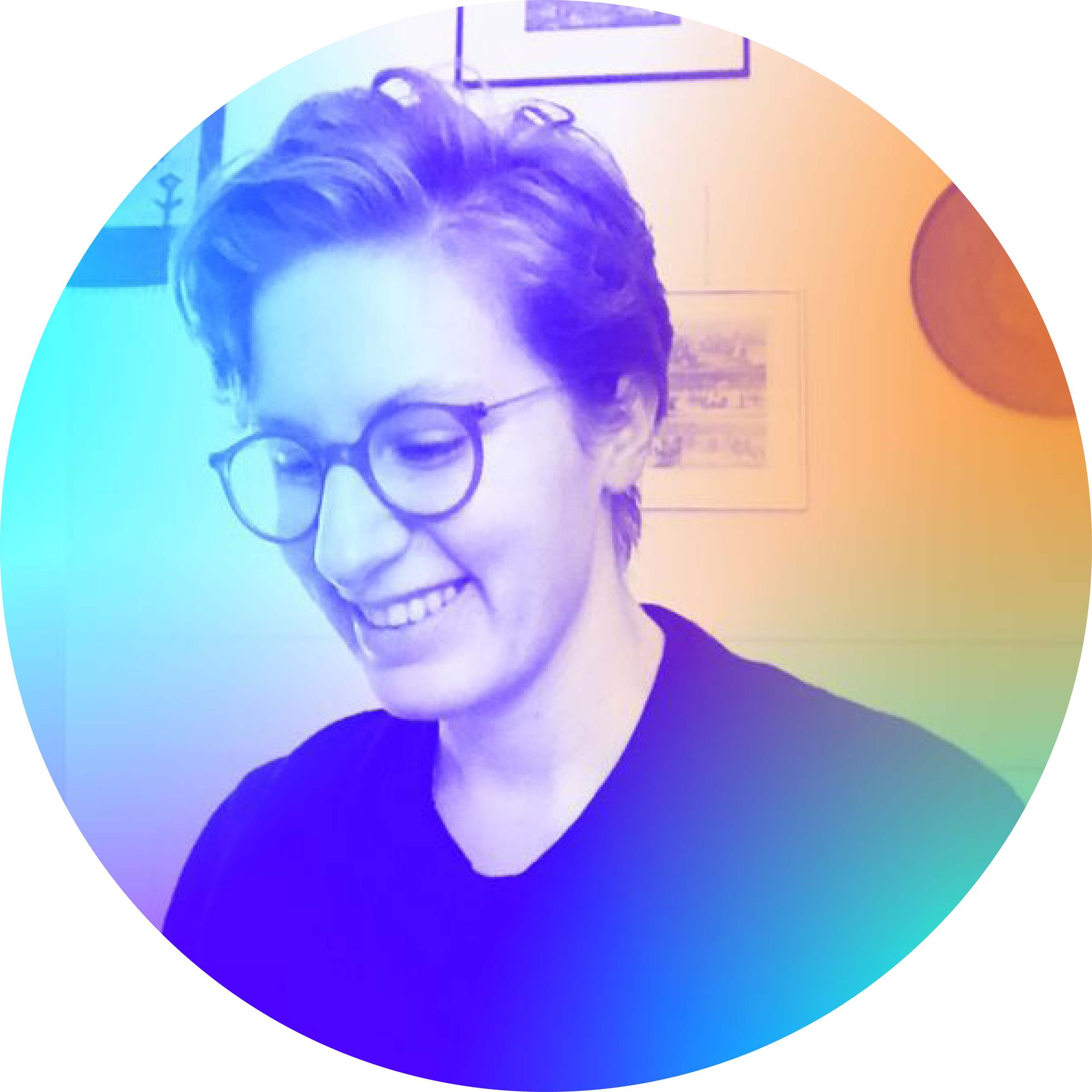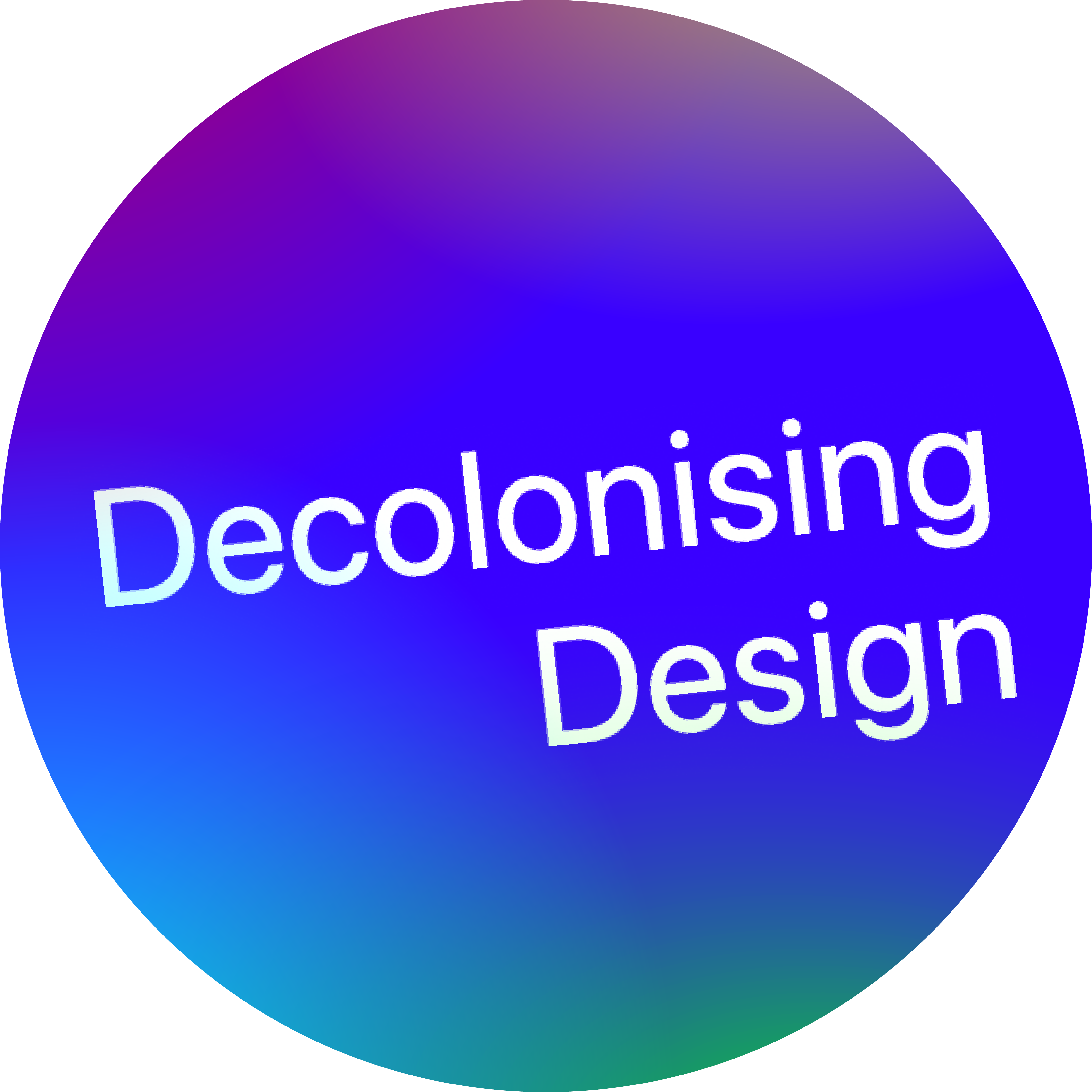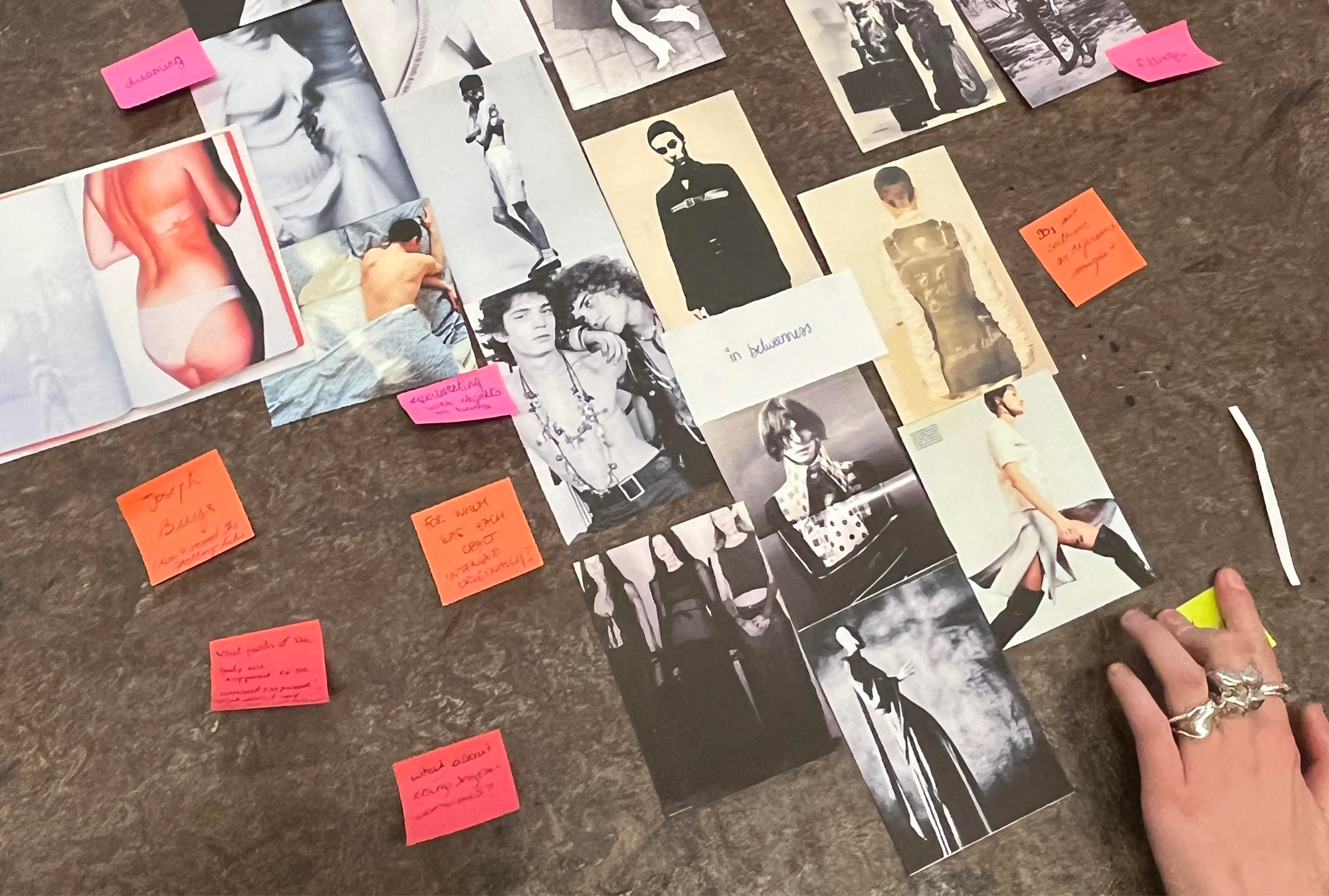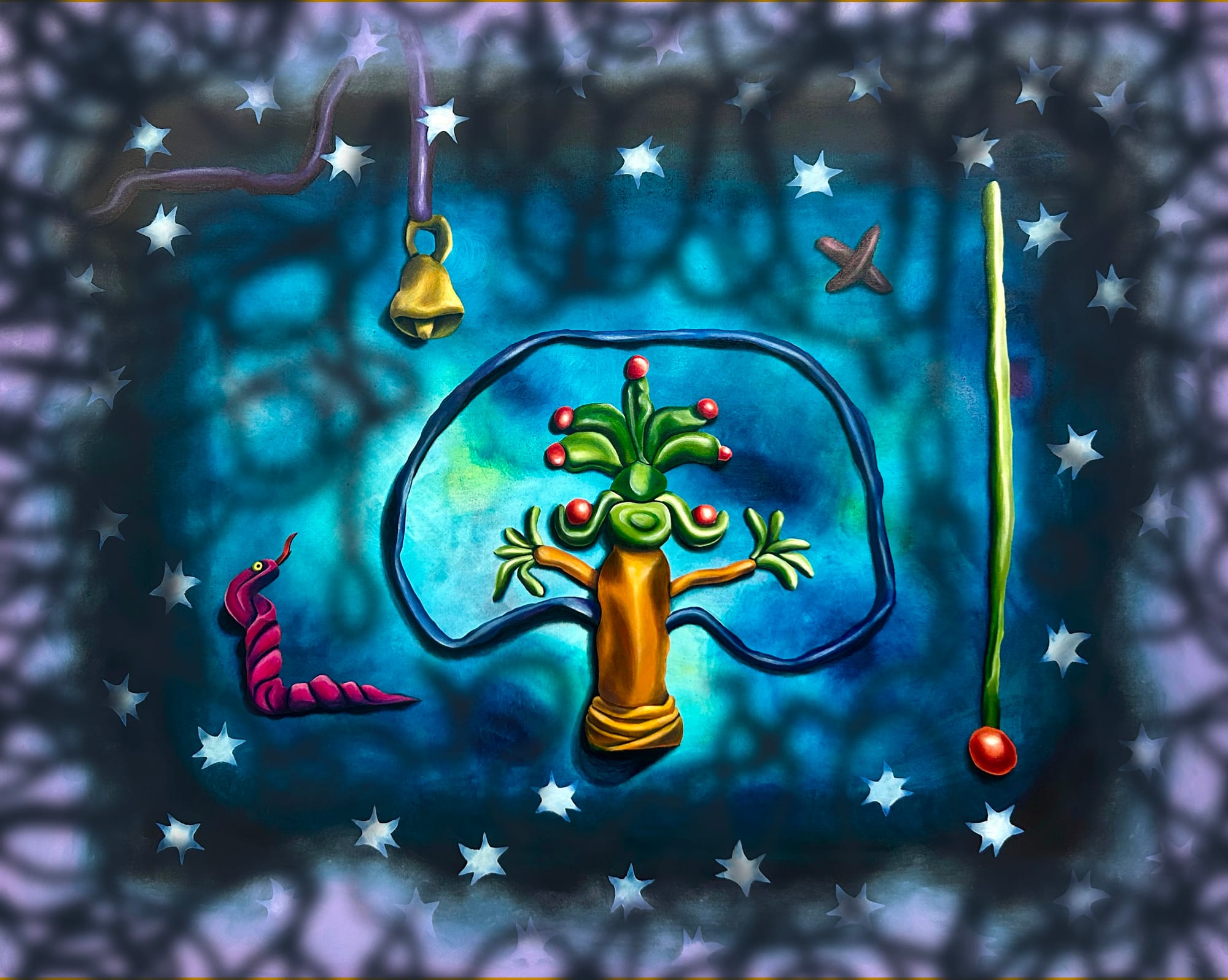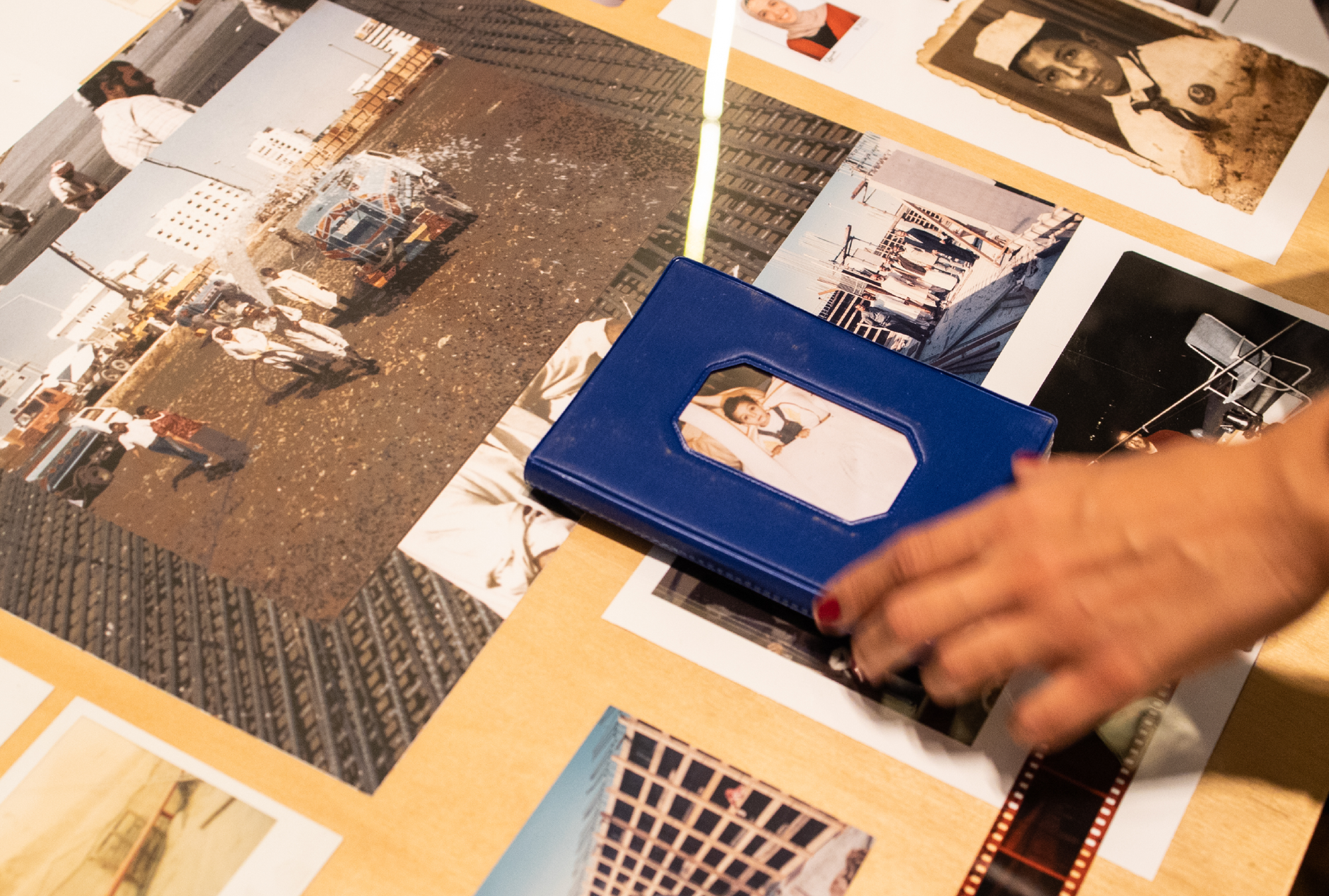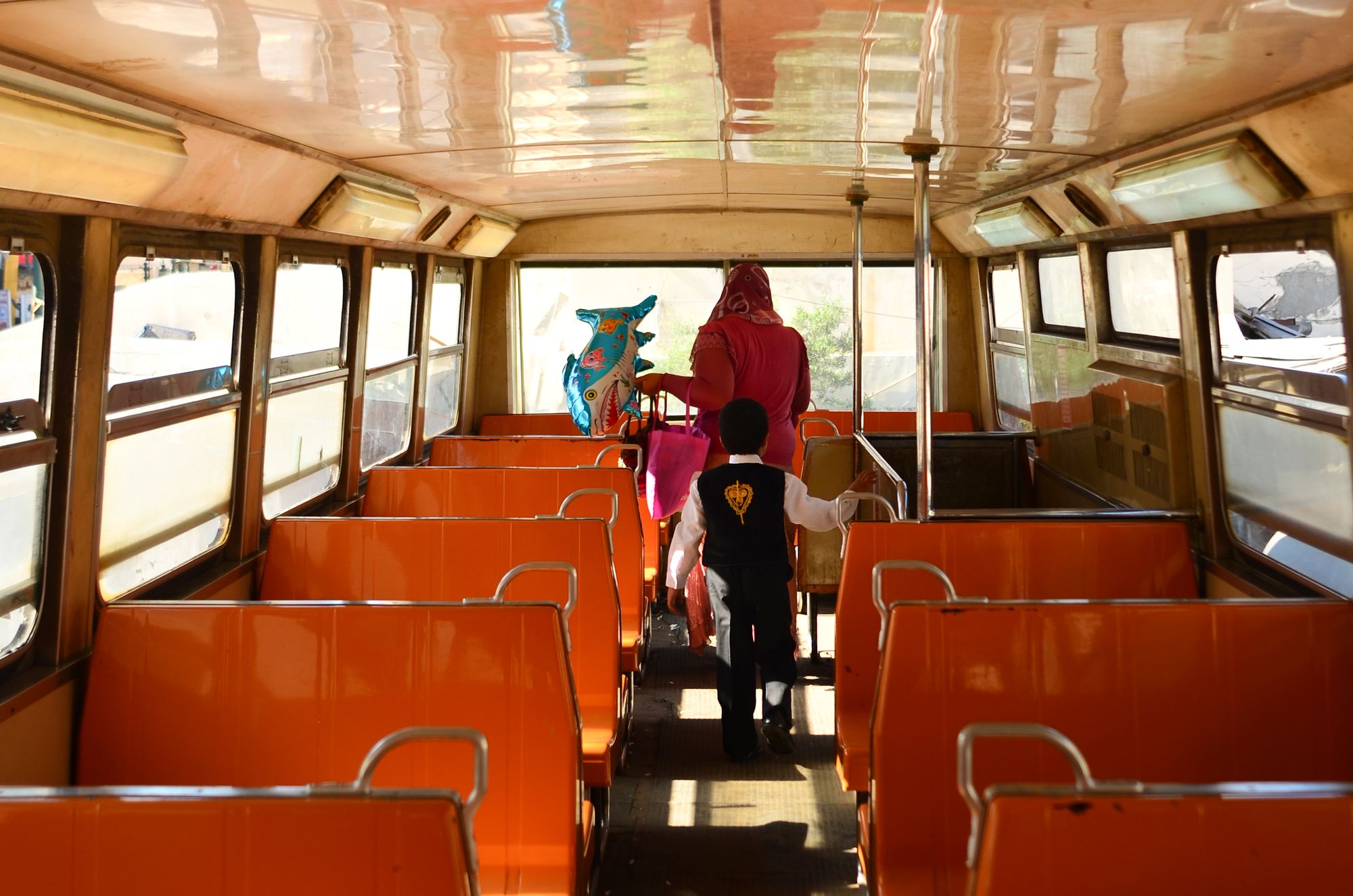
Everyone in this room is exhausted. The last few days have been an emotional rollercoaster. It’s September 2019, a late afternoon in a rental flat in Porto. Outside, the sun shines bright orange as if it was summer’s last breath. The door to the small balcony is open, letting in the sounds of seagulls croaking in the remote background. It takes a while for everyone to gather around the coffee table on an assembly of couches and armchairs. Matt is on the phone, Mahmoud and Danah are on the balcony, Pedro and Ece are dozing off on the couch. As they finally take a seat, it’s hard to begin. We, the interviewers, don’t quite know how to bring the conversation to a start. They, the interviewees, are visibly downcast. We had suggested postponing the talk, in light of everything that had happened over the past few days, but they nevertheless insisted on going ahead.
This interview had been in planning for several months. It all started when we heard that all of the founding members of the Decolonising Design group were going to be in Porto. We saw this as a historic opportunity to have a collective conversation with all of them together. In the three years that the group has existed, they have never managed to meet in a single room. This was finally going to happen on the occasion of “Real World: Design, Politics, Future,” the 2019 Papanek Symposium, a design conference organized by Alison J. Clarke and Francisco Laranjo as a partnership between the Papanek Foundation and the Porto Design Biennale. The program spanned two days. The first consisted of lectures followed by short panel discussions, covering topics such as design justice, control and care, decolonial futures, cosmo-localisms, and more. The second day was devoted to workshops and open forums entirely led and organized by the Decolonising Design group, that is, by Danah Abdulla, Ece Canlı, Mahmoud Keshavarz, Matthew Kiem, Pedro Oliveira, Luiza Prado, Tristan Schultz, and Ahmed Ansari.
Decolonising Design was founded in 2016 by these eight design researchers, artists, and activists, all of whom stem from or have ties to the Global South. At the time, most of them were in the process of writing or completing their Ph.D.s. The group officially emerged on June 27, 2016, through the simultaneous launching of several digital channels: a Twitter account, a website, and an email address. The date, four days after the Brexit referendum, coincided with the opening of the annual Design Research Society Conference of 2016 (DRS), which took place in Brighton, UK, and was themed “Future-Focused Thinking.” The group had submitted one paper and one conversation proposal to that conference. The first was summarily rejected while the second was unanimously accepted. This discrepancy prompted a series of discussions within the group and ultimately led them to withdraw their second proposal. None of them attended the DRS conference. Instead, they went public. Their newly founded website opened with a statement to the DRS 2016, in which they addressed the politically charged reviews they had received and advocated for a “profound debate and redirection of the colonial ethos of design and design research.”
“We live and work on the border, shuttling back and forth between the knowledge of our lands, deemed peripheral, and the logic of Western, Anglophonic and neoliberal academia, regarded as central.”
—Decolonising Design group
“We live and work on the border, shuttling back and forth between the knowledge of our lands, deemed peripheral, and the logic of Western, Anglophonic and neoliberal academia, regarded as central,” read their statement. It continued: “The struggle against the colonisation of knowledge, i.e. the colonial conditions that inform knowledge production and validation, is not only part of our work, but part of our lives. Coloniality is not an abstract concept nor is it a subject to be examined from a comfortable distance. It is something that affects our communities, our countries, and our peoples every single day. It is a continuous process of domination and violence to which we are submitted. It demeans our knowledge, subjugates our bodies, and renders our lives arduous. For us, decolonisation is imperative for survival.”
The launch of the Decolonising Design platform was announced through the JISC PhD-Design list, a mailing list for design research set up in 1998, which currently counts 3,220 subscribers. The news was met with enthusiastic support from numerous researchers and scholars from Canada, Colombia, India, Turkey, the US, UK, and others. However, it also provoked skepticism, contempt, and downright harassment by a small group of white, male, European scholars in the same list—some of whom are well established in the field. Despite this initial backlash, since 2016 the group has remained active, curating conferences, editing journals, organizing workshops, speaking at conferences, and writing.
The dream of bringing all members of the group into one room in Porto never happened. Luiza Prado and Tristan Schultz were unable to come for personal reasons, while Ahmed Ansari, one of the symposium’s keynotes, didn’t get his visa approved in time. “I am not here today because of a sequence of events that speak heavily to the ways in which diplomatic institutions are set up to make it extremely difficult for people from select nationalities and backgrounds to traverse borders,” he wrote in a statement read aloud by the other members of the group. His statement continued: “It is tiring to endlessly negotiate the mazes of academic and government bureaucracy expending ever more precious time, capital, and mental and emotional labor to obtain a visa to catch what amounts to a mere eight-hour-long flight across the Atlantic. I still consider myself very lucky and privileged to be where I am in life right now. I am always acutely aware of how many others, and not just international scholars, live lives of extreme stress and precarity, and yet the fact remains that the border remains the most enduring symbol of the legacy of colonialism.
Ahmed’s statement concluded with a crescendo of pleas for academics to use their privilege to support and empower underprivileged colleagues and students. With the words “do your homework” as a resounding metronome, Ahmed called for fighting against cheap or unpaid academic labor, pushing for unionization of academic institutions, as well as promoting the work of marginalized scholars and thinkers. As the five members of the group alternated reading his words, the statement was interrupted by applause and shouts of support from the audience.
The following day, the entire program of the Papanek Symposium was led by the Decolonising Design group. Both expectation and anticipation seemed high. Because they were fewer in number than originally planned, the group opted for canceling one of three workshops. Approximately sixty people attended “Design Politics of Bodies: Tackling the Coloniality of Bodies and Borders” and “Decoloniality and Pedagogy: Research and Learning Within the Westernized University.” We participated in the latter, which consisted of informal group discussions around questions of everyday discrimination within design education and the minor gestures that teachers might employ to make a difference. We appreciated our exchange on how to talk about complex problems and heavy theory with students, and how to tackle racism, sexism, or homomisia in the classroom. We left shortly before it ended, because of another engagement that day.
“There is here an epistemological change. For decades, it has been the same white scholars on stage. And now that these researchers from the Global South are finally given space, instead of listening, you want to come to the stage?”
—a keynote lecturer at the Papanek Symposium 2018
The events that followed are partially reconstructed based on conversations with participants who stayed. According to these accounts, after the two workshops, there was an open discussion round in the lobby where the workshop had been taking place. One well-established scholar expressed his disappointment and questioned in what ways the two workshops were related to decoloniality. “We were expecting a bit more, we came here as allies,” he reportedly said. Heads nodded in agreement, and a snowball of reactions followed. Other participants complained that the original program had been changed, especially that the morning session, called “Portuguese Colonialism,” had been omitted. Apparently and understandably, many people had come for that. The Decolonising Design group responded, somewhat passive-aggressively, saying that they always face unrealistic expectations and that the workshops were exactly intended to counteract such expectations. There is no “kit for decolonizing anything,” the group reportedly countered. By then, the tension between them and the audience had become evident.
At that point, everyone moved to the auditorium, where the previous day’s lectures and panel discussions had taken place. The five members of the Decolonising Design group stood in front of the first row of chairs with their backs to the stage, facing the workshop participants who were sitting in the audience. There was another round of questions. Eventually, someone took the microphone to question that hierarchical setting. Why not a more “equal” sitting disposition, like the circle before? The group explained that they had been asked to take this position, but that they were open to sharing it. Multiple audience members went on stage and the debate on decoloniality, intersectionality, and the environment continued. Shortly after, however, a keynote lecturer from the previous day who had remained in the audience took the microphone and exclaimed, “There is here an epistemological change. For decades, it has been the same white scholars on stage. And now that these researchers from the Global South are finally given space, instead of listening, you want to come to the stage?” Several people apologetically left the stage and went back to their seats. The event concluded awkwardly not long after with discontent still lingering in the air. Some comments were taken to Twitter—some positive, while others highlighted the friction throughout the symposium. When we met for the interview the day after, frustration had been joined by exhaustion. And yet, we talked.
Nina Paim & Eliot Gisel: How did the Decolonising Design group start? How did you first connect?
Danah Abdulla: I met Pedro and Luiza at the Fadfest conference in Barcelona in the summer of 2014. We started talking about our Ph.D.s and I gave them my card. One year later, Luiza reached out to me through academia.edu and asked if I was interested in writing a paper with six other people. I said sure.
Pedro J S Vieira de Oliveira: This was the paper we submitted to the DRS in 2016. It was written by Ece, Mahmoud, Luiza, Danah, myself, as well as Rodrigo Gonzatto and Fred van Amstel—two other Brazilian researchers who were also dealing with critical design at the time. Luiza and I met Mahmoud at the DRS 2014, which took place in Umeå, Sweden, and was called “Design’s Big Debates.” I attended a conversation on “Violence, Militancy, and Design Research,” which was cochaired by Mahmoud. Eventually someone said, “Yeah, passports are obsolete, we don’t need passports to cross borders anymore.” Of course, this got me really angry. I threw my residency permit onto the table and said, “How can you say that passports are obsolete since this card determines whether or not I can be here?” And this shifted the entire conversation. Afterward, Mahmoud and I were both still really angry, but through this experience we became friends. And by then, Mahmoud already knew Ece right?
Ece Canlı: Yes, in 2010 I went to Sweden to study experience design at Konstfack. Each new student was paired with a “buddy”—a senior who would show you around the campus. Mahmoud was my buddy. Of course, he was very critical of the program, but he didn’t say much at first. A few weeks later I asked him, “What’s going on here, what’s happening?” We bonded both on an intellectual and on a friendship level. Mahmoud went to do his Ph.D. in Malmö, while I returned to Turkey, and later came to Portugal to do my own Ph.D. A couple of years later, Mahmoud wrote saying that he had just met someone who was doing similar work in gender and sexuality studies. He introduced me to Luiza and it was love at first sight! By then, we realized we needed a place to talk.
Pedro: After we submitted our paper to the 2016 DRS, we got these very questionable and biased reviews. Putting it bluntly, they basically said, “Yeah, decolonization is important but what you are saying is probably too radical.” They found whatever problem to reject our piece. Luiza and I were very frustrated, so we reached out to Matt and Ahmed, whom we had met through the online forum of the Design and Violence online MoMA exhibition. We were trying to find consonance, and I think it was Ahmed who suggested using the project management app Slack. It was already all of us except for Tristan. It was Matt who brought in Tristan, right?
Danah: How did you meet Tristan?
Matthew Kiem: I attended a number of HotHouses, which were a series of symposiums that brought together creative thinkers around ideas for transforming urban environments. They were run by Tony Fry, who was also the head of the Master of Design Futures at Griffith University in Brisbane. Tristan was a student in that master’s course. He participated and actually helped to run some of these HotHouses. I got to know his work, and how he was interested in decolonization, and thought he should be introduced to the group.
Pedro: Then we crafted that statement about DRS together over Slack.
Mahmoud Keshavarz: Things happened really fast! In one day we made a Twitter account, the website, a Gmail account.
Pedro: We wanted to release the platform exactly on the day of the DRS. That was the idea. And that’s when the shitstorm started.
Ece: The entire PhD-Design list started throwing stones.
Danah: But there was also an incredible amount of support that came from people who were so glad to find such a platform! I think launching it at the opening of DRS was a good tactic, we really got the attention. Several people who attended DRS said that it took over the conversation.
Mahmoud: Because none of us was there. That was the point.
Danah: We decided not to attend. We had submitted two proposals: one paper, one “conversation.” And they had significantly different reviews. The paper was rejected, but the workshop got ten out of ten!
Mahmoud: But it was the same content, the “conversation” was just a shorter version of the paper.
Why do you think that happened? Why was the workshop praised and the paper rejected?
Ece: I think the conversation was less threatening and that they saw it as checking a “diversity” box. For the paper, each of us wrote a different section, and an introduction and conclusion tied the text together. Although the call for papers welcomed more performative and explorative approaches, the reviewers said that ours was not an acceptable format. But actually, I don’t think the problem was the format, the problem was the content. I remember one reviewer saying, “But the author is actually affirming illegality” while they were still justifying the rejection with the fact that our paper was “off-format.”
Mahmoud: Usually, in conferences, the pool of paper reviewers is different from the pool of workshop reviewers. Papers are often reviewed by senior academics, while workshops are evaluated by lesser-known scholars, who are maybe more open-minded reviewers. And of course, academically speaking, a peer-reviewed paper is ranked differently from a workshop. The first would be counted as a publication but the latter would not. So it matters.
Can you talk about the blow-up on the PhD list?
Ece: I try to forget about that.
Pedro: It was heavy. From my personal perspective, it took a very strong emotional toll. But I think that is more for Luiza to say, she was in at the center and took the heaviest blow.
Mahmoud: Luiza was the one who sent the message to the PhD-Design list announcing the launch of our platform. But there was already a history a few years back with her on that list, when Mariam Assad, then a Ph.D. student at Georgia Institute of Technology, posted a call for papers for a workshop event titled Exploring Social Justice, Design, and HCI, and there was a similar backlash. Matt even wrote a piece about it on Medium, called “With friends like these who needs the PhD-Design List.”
Pedro: Parallel to the personal attacks against Luiza, there was a general dissatisfaction along the lines of “Who are these young scholars trying to question the establishments of this discipline?”
Danah: It was unreal. I feel I’ve erased most of it from my memory. I don’t even remember the comments.
Ece: I remember one comment: “Take decolonization out and put a chicken there, and it’s the same thing!” It was completely absurd and condescending. But I think it’s not worth going there. First, we were following the reactions and asking ourselves, is this real?… Mentally and emotionally it was completely exhausting.
It has now been three years since this happened. Looking back, what do you think have been milestones or important successes for you since then?
Mahmoud: The Malmö symposium, “Intersectional Perspectives on Design Politics and Power.” I was done with my Ph.D., but there was still some money left. So even though I had lots of conflicts with my institution, I thought “Let’s just do a symposium.” Not so many people from my institution showed up, but lots of other people came.
Danah: In 2017, Luiza, Tristan, and I went to the research pavilion at the Venice Biennale. The keynote was canceled, so we happened to have this huge time slot talking to a very small room, speaking to a group of mostly artists. People were quite engaged. Then we turned that into a chapter for a book called Extra-Curricular.
Ece: The Design and Culture issue we edited was especially important for us in terms of working, writing, editing, and organizing everything together. It was a good experience on how to manage our own dynamics, who takes space, whose voice is there and whose is not. And then we went to the Swiss Design Network 2018 conference, “Beyond Change: Questioning the Role of Design in Times of Global Transformation.”
Danah: With everything that had happened with the PhD-design list, I think “Beyond Change” was a big thing. We were still around and people had to deal with it. These discussions are here to stay.
Pedro: One thing about “Beyond Change” that made an impact was the library. I still think about that library a lot, the number of people going through those books, taking pictures and writing things down. We consciously selected books that were not related to design but we thought could be useful for design. On a personal level, this is something that I want to carry into anything I do. I remember someone mentioning Harsha Walia’s Undoing Border Imperialism during one of the conversations, and so many people said, “I want the book, I just want it!” I think this is almost half of the job done. Making people read such a radical book that most likely they would not have encountered otherwise.
Danah: Being in the classroom every single day, you are always scared about how students are going to react to these ideas and topics. But then you get emails, “Could you please recommend something I could read?” That’s fantastic! I can just give the link which collects all the references from our library, which is still online and available.
“Often work emerges out of respecting each other’s time. It’s based on a mutual understanding that not everyone is available and that this is OK.”
—Pedro Oliveira
How do you work together?
Mahmoud: I think most of it is contingent. Often we create a Slack channel to discuss a project, and maybe one person or two or three will take that responsibility. Sometimes there are projects that we try to do together, like the symposium in Malmö, or the Design and Culture issue. There are different topologies. It depends on how available people are, based on their other jobs, lives, issues, or emotional availability.
Pedro: Often work emerges out of respecting each other’s time. It’s based on a mutual understanding that not everyone is available and that this is OK.
Ece: I like this metaphor of the “sphere.” It’s not a pyramid, there are no edges, there’s no leader. It’s more about different people taking part at different times and in different forms.
Mahmoud: As an example, the Design and Culture issue was a huge project. Securing reviewers, checking their revisions, editing, all the while we all live in different time zones, so it’s hard to have a continuous discussion. I would write one comment, and it’s already one day ahead in Australia, and several hours behind in the US. It’s hard to follow up and have a Skype. In that, Tristan was great. I think that if it weren’t for him that special issue would not have come out.
Matt: We recognized that Tristan had a significant role in that. That’s why we decided to put him as lead-author. I think one thing that has always been important for me is to consider that the work which the people in the Decolonizing Design group produce is always going to be a product of the conditions under which each of us is living. The way things come together, the amount of time that things take, the ability to choose particular projects, who is able to participate, they’re going to be different from the realities of people in more secure, privileged positions—notwithstanding the various privileges that each of us has in different ways. The work that this group produces is an embodiment of all the particular difficulties that people have. As well as the fact that living in so many different time zones is difficult to organize in itself. Plus trying to address our own responsibilities and our respective lives to other people means that we are not always available for Skype meetings, for instance. Skype meetings require considerable effort to organize and are always very special events. I’m always looking forward to them, whenever they happen. And it’s extremely difficult to get people into the same room. We have not yet managed to get everyone into the same room. Our work is the product of those conditions, and many others that I’m sure I’m overlooking. And, of course, that’s no different from any other academic work, or design work, or any kind of work, for that matter. Work is the product of material conditions. It’s important to understand that the reason why sometimes the work looks different is because it embodies these differences. There are complications and there are challenges, but there are also a lot of privileges and advantages that we have. The work is a product of the group conditions and of how we have managed to support each other but also learn from one another.
“We always say that we’re more of a ‘support group’ than a ‘research group.’ It’s about care. The group is a place to go and share the challenges and struggles we’re facing as researchers, but also in our personal lives.”
—Ece Canlı
In light of the many structural challenges you face, could you talk about how the group helps you and supports your work?
Pedro: I think we all agree that without a group we wouldn’t have finished our Ph.D.s.
Ece: We always say that we’re more of a “support group” than a “research group.” It’s about care. The group is a place to go and share the challenges and struggles we’re facing as researchers, but also in our personal lives. During our Ph.D.s, we were all tackling very severe issues such as racism, sexism, coloniality, borders, illegality, white supremacy, etc., which are really hard to deal with. It’s not just about navigating design academia, but actually dealing with those heavier issues. The group became a place to share our experiences, give and receive advice, or just be there for each other. Do you want to talk? Let’s Skype.
Danah: Or just to have people read your work and critique it. I remember sending a chapter to Matt—this was the first time anyone read anything from my Ph.D. Matt got back to me very quickly, understanding my necessity of timeliness. Getting his comments was really important, especially because he was able to read it before it was submitted. Of course, I knew other people who could help me with grammar, but that was different. This is really important for me, having someone I trust to look at and critique my work without being destructive. Unfortunately, in academia people hide behind blind peer review, which, in my opinion, is ruthless. Even for the chapter I’m contributing to the Beyond Change publication, Pedro contributed really great comments.
Pedro: During the Ph.D. process, most of us—if not all of us—vented on Slack at some point. Finding that space in which we could just say anything and have support from others was really important. That sense of, “We are here, keep strong, we have to stick together.” In my case, it was just me and Luiza in the same department fighting against a very conservative mindset and being literally the tokens of that department, finding no support whatsoever within the German scope of design academia. Having feedback from others who had faced or were facing similar challenges helped us in situating ourselves. It made us realize that what we were trying to do was not absurd but had resonance and value.
Matt: Academia can be tough. It’s often a process of trying to break people down. And to an extent, I think that’s a necessary process. You’ve got to challenge yourself into thinking. But there’s not enough emphasis on building people back up again. Our network helped us to do that for each other. When people were being broken down or spun out into a condition of confusion—which is very common, because people kinda pull the rug out from underneath you—sometimes that’s necessary, sometimes it’s not. And even if it is necessary, it’s always good to have someone or many people around you that help with the building up. It’s nice to be able to have a group or a network. I like the word network better, because it’s not like “decolonizing design” is hermetically sealed. It’s not just us. We have partners, we have friends, we have other projects, we have other networks, all of us, outside the group. And that comes back into the work that we do as well. And the other way around, the work that we do in the Decolonising Design network feed back out into these other projects. And not just into projects, but into our lives in general, into our families and friendships. There’s a bit of us in each of us, because we’ve been working together for so long. At the same time, we are trying to maintain this idea that everyone is coming from a particular place, so it’s not like we’re this flat homogenous entity. In the process of building each other, we contribute to the production of each other—and to the repair of each other.
“This is really important for me, having someone I trust to look at and critique my work without being destructive. Unfortunately, in academia people hide behind blind peer review, which, in my opinion, is ruthless.”
—Danah Abdulla
You are talking a lot about support structures and networks of support. What are the immediate networks of support in your surroundings that would need to be established or expanded for you to keep on doing your work?
Matt: This concept of network comes from my engagement with xBorder, the activist network that sprang from the work of Angela Mitropoulos. She was the one that emphasized that xBorder is a network rather than an entity. Decolonising Design is influenced by my engagement with xBorder, and that then feeds into this network. My engagement in xBorder is, in part, a product of my wanting to find something to make my design education meaningful. And my engagement with that was maybe one example of a network that was supportive of my own thinking. Through that I’ve learned that you have to also give back.
Mahmoud: One does not choose these difficult issues—we’ve arrived at them because of our personal lives, the encounters and choices we’ve made. For me, for example, a lot comes from my involvement in no-border activism in Sweden. I understand the notions of borders and legality through this activist engagement. The way I see it, it’s not enough to just talk about borders—whether you like it or not, you actually have to reach out and be in other spaces. I’m now doing something called “Critical Border Studies” with a bunch of anthropologists and migration scholars. We study how migration knowledge is produced—migration as actually something that historically has been made here, in Europe, at the heart of the empire. I work with people in other disciplines that have similar frustrations concerning the ways we write and talk about borders. There is a bunch of professors— mostly, of course, people of color—who now engage with this issue. Still, if I get in trouble within the field of design discourse, for them it is very hard to support me, because they don’t know this discourse, they don’t know anything about design. So I also need to build support structures moving in this other discourse too, which takes a lot of time and requires a lot of commitment.
Pedro: Back in Brazil, I was involved in student movements both during high school and university, trying to move things in a different way within the privileged spaces I occupied. After I moved to Germany, I lost that space. I was not involved in direct activism during my Ph.D., as Mahmoud or Matt were. It was then through my own Ph.D. research that I reconnected with those experiences. For me, Decolonising Design helped open up that space again, a space in which I could figure out my scope of action, what I can do that feels truthful and necessary. This requires a reflection on one’s own body politics. For example, I wrote my thesis about Brazil while living in Germany. What is the scope of action as a Brazilian living in Germany talking about Brazil? Where can I intervene without just talking from outside? This requires bringing together all the experiences from my upbringing as a “troublemaker,” and becoming a troublemaker again within the academic discourse. In that sense, there’s maybe not so much difference between academic networks and activist networks.
“…just surviving is an achievement. Holding it together. Holding your life together while you are under pressure and while there are active colonial structures that are trying to pull people apart in different ways depending upon who they are. Sometimes, just surviving is the way it’s done.”
—Matthew Kiem
What are the immediate walls surrounding you, the structures that are stopping you from doing work? How you are dealing with dismantling them?
Danah: You would expect your institution to support you, but not everybody has that obviously—and in fact most people don’t have this. I don’t feel like I have this. I think that already sets you up for failure. The other thing that sets you up for failure is the idea that you are not allowed to fail. Which is bound to make you fail, right? Because then there is all this pressure on you. It’s easy to get disheartened.
Matt: In terms of what could be done to dismantle it, I don’t know how to answer this directly. In an important sense, just surviving is an achievement. Holding it together. Holding your life together while you are under pressure and while there are active colonial structures that are trying to pull people apart in different ways depending upon who they are. Sometimes, just surviving is the way it’s done.
Danah: We are living on the margins. Sometimes you don’t want to get out of the margins, but then again, it can be a very lonely place.
Mahmoud: It’s quite hard to change institutions from within. It’s important to remember that every time you encounter these kinds of hindrances, they knock you down, right? And it takes a long time to recover. Sometimes you refuse to engage in certain practices, or you make choices that might not be good for your career and future. But you have to do it because it’s just too much! When these things happen I think, “OK, honestly, I have to talk about this.” This is an act of love. Many times we discuss small strategies through commenting or chatting. For me, it’s the group that helps to navigate this. I’m not sure if we will ever be able to really dismantle those walls, at least not yet, because we are not in the position of being able to do so. But we are navigating through them, finding some sorts of escape routes.
Ece: There’s one kind of wall we have always have, actually: the “blank space” we face when we talk about these issues. Sometimes it’s good when people react and say things—like what happened yesterday. Maybe they had an idea, maybe they agreed, maybe it’s just a stupid comment, maybe they are ignorant, but at least they say something. But sometimes—maybe people are being “politically correct” —there is just blankness. All of a sudden you teach in a Western university, so you have all these Western students with many privileges. And what you say seems to not get through to them. You feel like you’re doing nothing, that what you do is not worthy. When Pedro started teaching he had all these questions and opened a Slack channel called “pedagogy.” He was asking for help, what to do with these issues, and everyone started sharing their experiences and methods. “This happened but it doesn’t mean that that student actually thinks as such,” etc. Now I just started teaching, and so find myself in that same channel. It’s not like there’s one challenge and then it’s resolved. It is every day.
“…our students are eager to learn. They are the future. They are going to be the scholars and designers of the future, so talking to them and caring for them and their themes is what’s important.”
—Mahmoud Keshavarz
What’s next? Ideas, projects, dreams, hopes…
Pedro: The decolonizing design toolkit, right? It will sell for €2,000.
Danah: No, €12.99!
Pedro: Oh yeah, right, it’s a subscription service! We do cross-border shipping.
[laughter]
Pedro: My parallel is really ridiculous, but I always think of the Brazilian rap group Racionais MCs, and how they say, “We come together when we need to come together.” We respond when we feel it’s worth responding together. The Papanek Symposium is an example of this. We chose to be here together.
Mahmoud: Who made this point about us not being project-based?
Ece: I was saying how, in general, the design field is so much project-based, but that doesn’t work for us. Things take time, and we need time. As a group, we put forward our critiques. What more can we say? How do we go beyond this threshold of explaining what decolonization is? Beyond the “Show me the examples” or “Give me the decolonizing toolkit” kinds of questions. What can our own research bring?
Danah: Do I see any changes within the design industry? Within mainstream design discourse? No. How do we affect that? I guess this is a very big project, but that’s something that would be interesting for us. Because when you are just talking to allies, people that share the same views as you, are you going to get very far? I don’t want to do a workshop and end it there, I want to build on it. Also, we are interested in making a book.
Mahmoud: A book that we would have wanted to see when we were undergrads.
Danah: Being a published author, that gives legitimacy. Rather than having only students and young scholars citing us, perhaps more established names would start citing us rather than other people—because, of course, if you cite one person you purposely exclude someone else.
Mahmoud: Do you think a book would necessarily make people take the discourse seriously? I’m not sure. There are already several books, which are largely being ignored. Again, this is the politics of citation. We have been doing this for three years, and we have been engaging with the discourses in the field, we have been engaging with the established scholars—with little progress. But actually most of us have the experience that our students are eager to learn. They are the future. They are going to be the scholars and designers of the future, so talking to them and caring for them and their themes is what’s important. That would change the language and orientation of our book.
Pedro: These experiences, even though they are sometimes emotionally very heavy, materialize the responses to the conditions and the propositions that we are putting forward as a group. When we say what we stand for and people realize that what we stand for is not solvable, it is not an easy conversation. It’s discomforting. It’s disheartening. But those responses and reactions inform how we assess the field. With this book project we want to make sense of all of these signals, of what is profoundly complicated and problematic within the field of design studies. How do we provide, not an answer but a direction, an orientation? We are trying to give at least some processing back—vomiting something back, so to speak—based on everything that has happened since we started the platform and everything that has happened before we came together as a group. Of course, it is a project that is bound to be incomplete, and that’s OK.
After the conversation we sat for a moment longer, silent and inert. At some point one of us got up to put on the coffee pot that had been abandoned before the interview started. It was Saturday, and Ece knew of a great music concert that evening. There was also an opening of another event across town. And the idea of going to the seaside to eat a typical Portuguese fish dinner. In the end, Danah, Matt, Mahmoud, Ece, and Pedro decided to stick to their plan to stay in the flat and use this precious time together to work. Outside, the setting sun was a burnt orange, the daylight soon gone, but their day was still not over.
Nina Paim (she/her) is a Brazilian designer, curator, and editor based in Porto. Her work spans exhibitions, workshops, and events, including Escola Aberta (Rio de Janeiro, 2012), Beyond Change (Basel, 2018), Department of Non-Binaries (Sharjah, 2018), Feminist Findings (Berlin, 2020), and, most recently, Etceteras: Feminist Festival of Publishing and Design (Porto, 2023). She has co-edited Taking a Line for a Walk (Spector Books, 2016), Design Struggles (Valiz, 2021), and Alter-Care (Esad-Idea, 2021). A three-time Swiss Design Award recipient, Nina has lectured internationally and her writing has been published by Occasional Papers (UK), Les Presses du Réel (FR), and the Korea Society of Typography (KR). In 2020, she co-founded the feminist platform Futuress.org, which she co-directed until 2023, when she launched Bikini Books, an independent publisher for design. In 2024, Nina was awarded an honorary doctorate from the London College of Communication at the University of the Arts London.
Eliot C. Gisel (they/them) is a Swiss journalist, editor, and researcher. With a background of being a design practitioner themselves, their writing has explored topics such as design education, dress culture, the digital turn in museums, city politics, visual rhetorics of resistance, and—for even more personal ones—LGBTQIA+ activism, culture, and the politics of language. They also co-founded Futuress.
This interview was originally conducted for the publication Design Struggles: Intersecting Histories, Pedagogies, and Perspectives, edited by Prof. Dr. Claudia Mareis and Nina Paim, published by Valiz in 2021.


